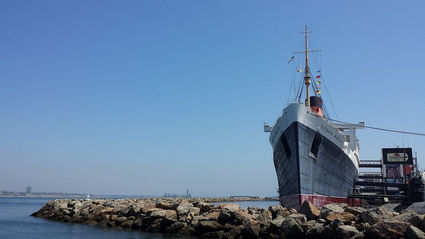


























What exactly is an ocean liner? Are cruise ships ocean liners? Are there any more ocean liners? These are all great questions! An ocean liner typically carries passengers from one port to another with a set route and schedule to maintain. Modern cruise ships, although large enough to be ocean liners, typically start and end their voyages in the same port, and are not as strong since they typically enjoy good weather. The Titanic was indeed an ocean liner, sailing during the first golden age of steam powered ocean travel. Unfortunately, the lifespan of ocean liners historically has an average of 25 years, so most either sit at the bottom of the ocean or have been sent to the breakers, otherwise known as ship recycling centers.
Ocean liners have been around since the 19th century with the advent of steam powered vessels being able to sustain constant speeds enabling the shipping industry to rely on timetables and schedules for the ships. The SS Savannah became the first ship to successfully use steam power on a trans-Atlantic trip, taking 27 days in 1819. Several years later, the SS Sirius and the SS Great Western finished steam powered trips across the Atlantic Ocean within one day of each other, setting up the race for the Blue Riband prize for fastest transatlantic crossing.
In the late 19th century, ocean liners no longer had auxiliary sails, used screws (propellers) of paddleboards, and were made of iron and steel. Many ships at this time boasted of fully climate controlled interiors with running water and electricity.
Ocean liners in the late 19th century and beginning of the 20th century typically were split into multiple classes, catering to the wealthy traveling and immigrants relocating. Ships transported millions of immigrants from Europe to Australia and the United States. Each nationality had distinct shipping lines emerge servicing those markets.
As a part of national pride, ocean liners were encouraged by nations to showcase their technological and industrial prowess. These ships were then also requisitioned into active military service, typically as a heavy cruiser, troop transport, and hospital ships. Ocean liners were instrumental in determining the outcomes of both world wars.
Have pictures of the
RMS Queen Mary
....and want to see them added to the collection? Feel free to contact us.
